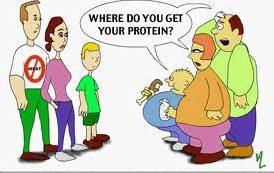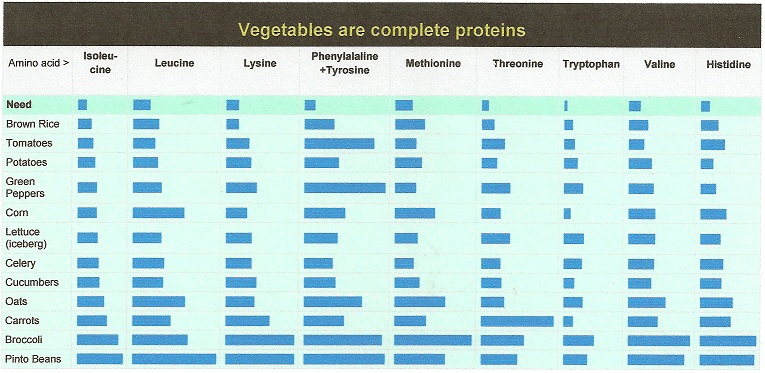Much of following article is from Physicians Committe for Responsible Medecine (PCRM) whose research and expertise on the treatment of various illnesses and the reversal of metabolistic disorders with a plant only (vegan) diet have acquired world wide recognition and Michael Bluejay’s amazing research.
Speaking of the Adkins diet, the President of the American College of Nutrition said, “Of all the bizarre diets that have been proposed in the last 50 years, this is the most dangerous to the public if followed for any length of time.”
In the past, some people believed one could never get too much protein. In the early 1900s, Americans were told to eat well over 100 grams of protein a day. And as recently as the 1950s, health-conscious people were encouraged to boost their protein intake.  Today, some diet books encourage high-protein intake for weight loss, although Americans tend to take in twice the amount of protein they need already. And while individuals following such a diet have sometimes had short-term success in losing weight, they are often unaware of the health risks associated with a high-protein diet. Excess protein has been linked with osteoporosis, kidney disease, calcium stones in the urinary tract, and some cancers.
Today, some diet books encourage high-protein intake for weight loss, although Americans tend to take in twice the amount of protein they need already. And while individuals following such a diet have sometimes had short-term success in losing weight, they are often unaware of the health risks associated with a high-protein diet. Excess protein has been linked with osteoporosis, kidney disease, calcium stones in the urinary tract, and some cancers.
The building blocks of life
People build muscle and other body proteins from amino acids, which come from the proteins they eat. A varied diet of beans, lentils, grains, and vegetables contains all of the essential amino acids. It was once thought that various plant foods had to be eaten together to get their full protein value, but current research suggests this is not the case. Many nutrition authorities, including the American Dietetic Association, believe protein needs can easily be met by consuming a variety of plant protein sources over an entire day. To get the best benefit from the protein you consume, it is important to eat enough calories to meet your energy needs.
Consider that human milk is 6% protein-That’s when we are growing the fastest and need more protein than at any other time in our lives. So if 6% is all we need when we’re growing rapidly, then as adults we certainly need less. Professional estimates are as low as 2.5%.1 The World Health Organization recommends about 5% to 10%, depending on various factors. The U.S. government’s recommendation is about 9%. In any event, whether you think our needs are closer to 2.5% or 10%, it is nearly impossible to fail to get enough protein, provided that you make sure to eat food. Every single whole plant food has more than 2.5% protein, and they all have more than 10% except for fruit. Protein is one of the easiest nutrients to get.
The trouble with too much protein
The average American diet contains meat and dairy products. As a result, it is often too high in protein. This can lead to a number of serious health problems:
- Kidney Disease: When people eat too much protein, they take in more nitrogen than they need. This places a strain on the kidneys, which must expel the extra nitrogen through urine. People with kidney disease are encouraged to eat low-protein diets. Such a diet reduces the excess levels of nitrogen and can also help prevent kidney disease.
- Cancer: Although fat is the dietary substance most often singled out for increasing cancer risk, protein also plays a role. Populations who eat meat regularly are at increased risk for colon cancer, and researchers believe that the fat, protein, natural carcinogens, and absence of fiber in meat all play roles. The 1997 report of the World Cancer Research Fund and American Institute for Cancer Research, Food, Nutrition, and the Prevention of Cancer, noted that meaty, high-protein diets were linked with some types of cancer.
- Osteoporosis and Kidney Stones: Diets that are rich in animal protein cause people to excrete more calcium than normal through their kidneys and increase the risk of osteoporosis. Countries with lower-protein diets have lower rates of osteoporosis and hip fractures.
Increased calcium excretion increases risk for kidney stones. Researchers in England found that when people added about 5 ounces of fish (about 34 grams of protein) to a normal diet, the risk of forming urinary tract stones increased by as much as 250 percent.
For a long time it was thought that athletes needed much more protein than other people. The truth is that athletes, even those who strength-train, need only slightly more protein, which is easily obtained in the larger servings athletes require for their higher caloric intake. Vegetarian diets are great for athletes.
To consume a diet that contains enough, but not too much, protein, simply replace animal products with grains, vegetables, legumes (peas, beans, and lentils), and fruits. As long as one is eating a variety of plant foods in sufficient quantity to maintain one’s weight, the body gets plenty of protein
Osteoporosis
Animal protein from any source is bad for bones. Studies have shown that animal proteins encourage increased calcium excretion and risk of fracture and osteoporosis.6-8 Many years ago, animal protein was thought to be advantageous, but it is now believed to be part of the problem, not part of the solution. Plant protein—in beans, grains, and vegetables—does not appear to have this negative effect on bones.9
Impaired Kidney Function
Protein releases nitrogen into the blood as it is digested and metabolized. When too much protein is consumed, this places a strain on the kidneys, which must expel the waste through the urine. High-protein diets are associated with reduced kidney function. Over
time, individuals who consume very large amounts of protein, particularly animal protein, risk permanent loss of kidney function. Harvard researchers reported that high-protein diets were associated with a significant decline in kidney function, based on observations in 1,624 women participating in the Nurses’ Health Study. The good news is that the damage was found only in those who already had reduced kidney function at the study’s outset. The bad news is that as many as one in four adults in the United States may already have reduced kidney function, suggesting that most people who have renal problems are unaware of that fact and do not realize that high-protein diets may put them at risk for further deterioration. The kidney-damaging effect was seen only with animal protein. Plant protein had no harmful effect.10
To find the answers to all your questions about “man’s carnivore dilemna” go to Michael Bluejay’s fabulous website http://michaelbluejay.com/veg/natural.html
To further prove that animal proteins such as whey and meat are not necessary to gain muscle or stamina, there is today a large and growing community of outstanding athletes including successful MMA fighters who have chosen vegan diet for ethical reasons. Be all you can be . GO VEGAN











